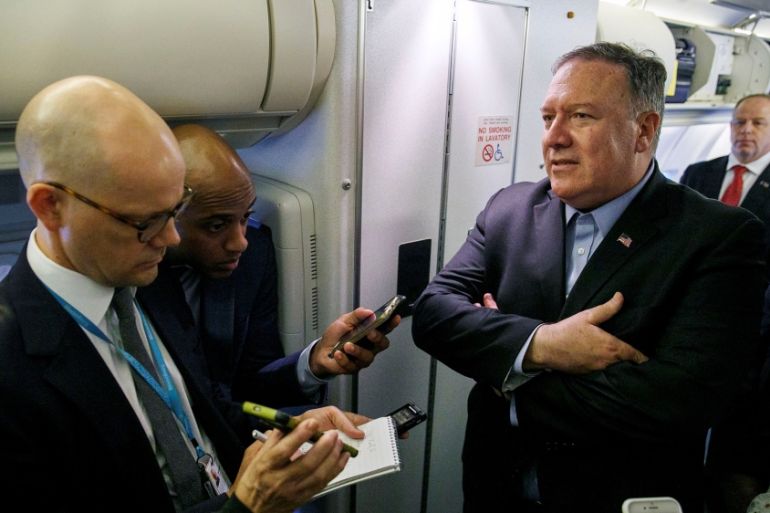US hopes for North Korea talks in days or weeks: Pompeo
US secretary of state remains upbeat about negotiations aimed at dismantling Pyongyang’s nuclear weapons programme.

The United States hopes to get back to denuclearisation talks with North Korea in the coming days or weeks, Secretary of State Mike Pompeo said on Sunday.
“We know Chairman Kim has continued to make the commitment to denuclearise. We are hopeful that in the coming days or perhaps weeks we’ll be back at the negotiating table with them. That’s the best outcome,” Pompeo said in an interview with ABC’s This Week.
Keep reading
list of 4 itemsControversial law sparks fist fight in Georgian parliament
‘Prejudice, Islamophobia’: Free speech fears as UK redefines extremism
Dominican FM on Haiti gang violence crisis: Spillover threat?
Negotiations aimed at dismantling Pyongyang’s nuclear weapons and missile programmes have stalled since the collapse of the second summit between US President Donald Trump and North Korean leader Kim Jong Un in the Vietnamese capital of Hanoi in February.
|
|
Trump and Kim met again in June at the border between North Korea and South Korea and agreed to reopen working-level talks, but that has not happened.
North Korea has fired a series of short-range missiles in recent weeks in protest against US-South Korea joint military exercises and the adoption of new weapons, complicating the reopening of the talks.
Pompeo said that despite those short-range tests, which he called disappointing, Kim has not violated the commitments he made to Trump and the US goal remains a verified denuclearised North Korea.
“I think President Trump would be very disappointed if Chairman Kim doesn’t return to the negotiating table or conducts missile tests that are inconsistent with the agreements that they made when the two of them were together these three times,” he said.
In recent weeks Pyongyang had been taunting Pompeo, calling on Washington to remove him from nuclear negotiations, calling him a “die-hard toxin”.
North Korean Foreign Minister Ri Yong Ho had also referred to his American counterpart as a “poisonous plant of American diplomacy”.
The peninsula has been divided since the 1950-53 Korean War, which ended with an armistice and not a peace treaty.
The US, which backed South Korea during the conflict, still has thousands of troops stationed on the peninsula and operates a so-called nuclear deterrence umbrella in the region.